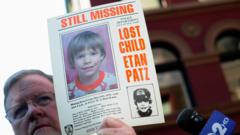The Second Circuit Court has ruled that Pedro Hernandez, convicted in 2017 of the kidnapping and murder of six-year-old Etan Patz, should receive a new trial or be released due to improper jury instructions that may have influenced the jury's verdict.
US Appeals Court Orders New Trial for Etan Patz Murder Convict

US Appeals Court Orders New Trial for Etan Patz Murder Convict
A landmark decision may lead to the release of a man convicted in the infamous Etan Patz case, as new trial is mandated.
In a significant legal development, an appeals court in the United States has ordered a new trial for Pedro Hernandez, the man convicted of killing six-year-old Etan Patz, who vanished from a Manhattan neighborhood in 1979. Hernández, a convenience store owner, was initially convicted in 2017, following a previous trial in 2015 that resulted in a hung jury. In his confession, Hernández recounted how he lured the young boy to a basement under the pretext of offering him a drink before tragically taking his life.
The Second Circuit Court of Appeals determined that the original trial had involved faulty jury instructions that were inconsistent with well-established federal law, which significantly impacted the fairness of the verdict. “We conclude that the state trial court contradicted clearly established federal law and that this error was not harmless,” the court stated in its ruling.
The case of Etan Patz, who disappeared while walking to a school bus stop, has remained a haunting aspect of New York City's history. The extensive search and subsequent media campaigns featuring the boy’s face on milk cartons raised national awareness about missing children. Despite significant investigations that included the FBI, the whereabouts of Patz remain unknown.
Hernandez's defense argued that his confession was not voluntary, citing his documented mental health issues and a low IQ. Although Hernandez initially confessed after a lengthy, unwarned police interrogation, he later provided video confessions that were used heavily against him during the second trial. The appeals court’s decision centered on how the jury was instructed regarding the admissibility of those confessions.
The judge's response to the jury's question about disregarding reported confessions if they deemed the initial one involuntary led to confusion and was deemed prejudicial. As a result of this error, the appeals court ruled in favor of Hernandez, providing him with the opportunity to either face a new trial or be released.
Hernandez's attorney expressed gratitude for the decision, urging the Manhattan District Attorney's Office to reassess the charges and focus on identifying the actual culprit behind Etan Patz's tragic disappearance. The case remains an enduring mystery, still unresolved over four decades later.



















